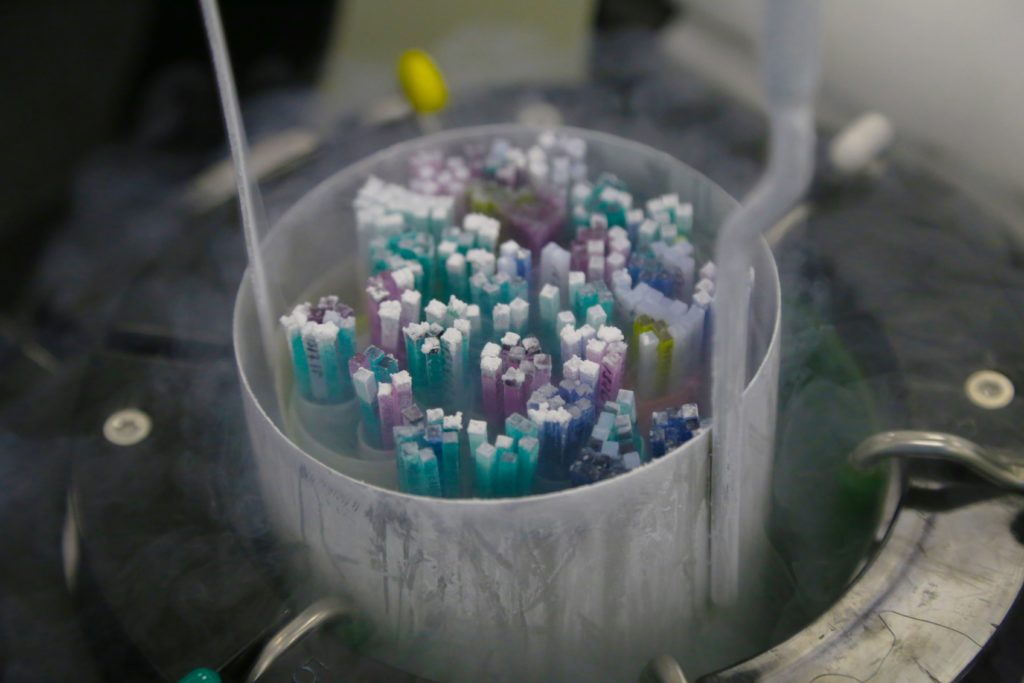In vitro fertilization (IVF) — the combining of ova and sperm in a lab directed toward producing human embryos — has become an increasingly common way to reproduce in the United States, with about 100,000 children born in the U.S. via the practice each year. Especially because of the pain of infertility, and a general sense (still) among many that having children is a good thing, a whopping 9 in 10 U.S. Americans think it should be a legal option for women.
It is perhaps with such overwhelming support in mind that Donald Trump has come out in favor, not only of legal IVF, but of federal government support of IVF and/or mandates that health insurance companies cover the very expensive procedure.
But as an essay in Angelus earlier this year explained, there are a host of serious moral and ethical problems with IVF. Perhaps the most damning one — particularly in the American IVF model — is that millions of “excess” human embryos produced are either discarded, used in deadly experiments, or contained indefinitely in what is essentially a frozen prison.
The procedure epitomizes what Pope Francis frequently condemns as “throwaway culture”: a world where getting what we want — especially in the context of a consumerist marketplace — is the top priority, regardless of who or what gets used and discarded in the process.
Logically, that involves dehumanizing people and turning them into things that can be more easily discarded. Sometimes the full humanity of especially the most vulnerable human beings can be inconvenient for us and our consumerist objectives.

This is certainly true of the human beings discarded, killed, and indefinitely imprisoned via IVF. Indeed, ignoring the truth we learned from Dr. Suess that “a person is a person no matter how small,” we will go so far as to deny the science that these are fellow (if tiny) members of the species Homo sapiens.
Disturbingly, the children produced by IVF are subject to the quality controls typical of the broader consumerist marketplace. Catholic writer Leah Libresco Sargeant recently pointed out the implications of the ability of American parents to choose certain embryos, and discard or indefinitely freeze others, based on the fact that one wants a boy (true of a number of immigrant communities), one wants a girl (often because of the perception that life is harder for males in modern culture), or one wants to avoid having a child who is likely to be disabled.
These turn even the chosen children into things — products — chosen because they meet the desires of parents. This is also sometimes facilitated by choosing donor sperm and ova based on the traits of the biological parents. Ova, for instance, can be more expensive to purchase on the open market depending on things like SAT scores, attractiveness of the photo, proof of a varsity letter, and more.
In short, when the connection between sex and procreation is severed — and replaced with re-production (seeing life as a product to be acquired in a consumerist marketplace) — gone is the idea that human beings are persons with an inherent and equal dignity regardless of their traits or market value.
This concern is at the very heart of Humanae Vitae (“On Human Life”) and the Church’s beautiful teaching on the need for procreation to never lose its connection to marital sexual intimacy. This understanding insists that children are free gifts from God, not something that we are owed and have a right to. And when children are understood as gifts, this bypasses the logic of the marketplace and is instead ruled by the logic of love, encounter, and hospitality. In other words, antidotes to throwaway culture.
There is certainly a need today for Catholics to help fellow believers who struggle to understand the Church’s teaching on IVF. And relatedly, we often don’t do enough to address the pain of infertility being experienced by so many today.

But when it comes to IVF, there are issues of justice here that should be reflected in law. Despite our culture’s slouch toward unfettered autonomous reproductive choice (at least as it exists in a coercive marketplace), Pope Francis has insisted that there should be laws restricting such choices. For instance, he recently called for a global ban on a “deplorable” practice often paired with IVF: surrogacy.
There is no right to reproduce however one wishes and Catholics are not the only ones to think like this. Indeed, the increasingly popular group “Secular Pro-Life” has a detailed set of explainers and arguments as to why even the earliest human embryos count the same as other human beings and why this matters for how to think about the morality of IVF. Protestants like Katy Faust (of “Them Before Us”) understand IVF to be part of a “child victimizing industry.”
Given the overwhelming support for legal IVF in our culture right now, there is virtually zero chance of banning the practice, Pope Francis-style. But there are still important and more realistic options for resisting the ways IVF contributes to the throwaway culture. For instance, like most of our peer countries, we could ban sex selective IVF. We could go the way of Italy and limit the number of embryos that can be created and require that all be implanted. We also could work with disability rights groups to ban discarding embryos based on disability.
And of course we could (and should) reject Donald Trump’s idea to force people to pay for IVF with their tax dollars and/or as benefits to their employees (something that would almost certainly result in another legal challenge from the Little Sisters of the Poor). We should instead use such funds to help equip (especially vulnerable) families to welcome the gift of children by making traditional birth free.
If we do not, and continue to instead promote IVF and the throwaway culture it supports, there is a very good chance it will become the default way we reproduce. The convenience and quality control will be too much to pass up in a culture that demands both. And if this happens, then the idea that children are gifts from God — rather than products we purchase on the open market — may in fact be something Western culture simply loses altogether.

